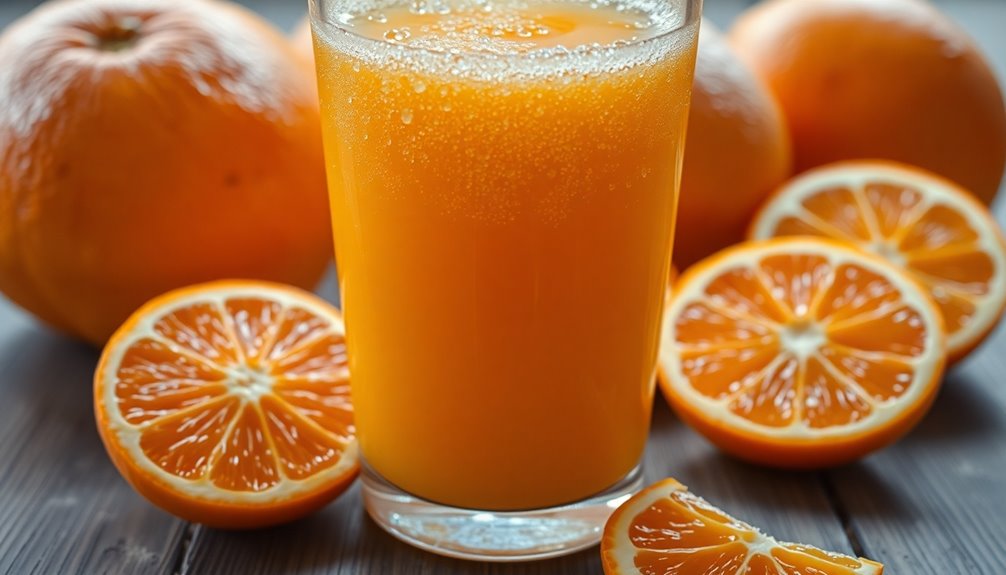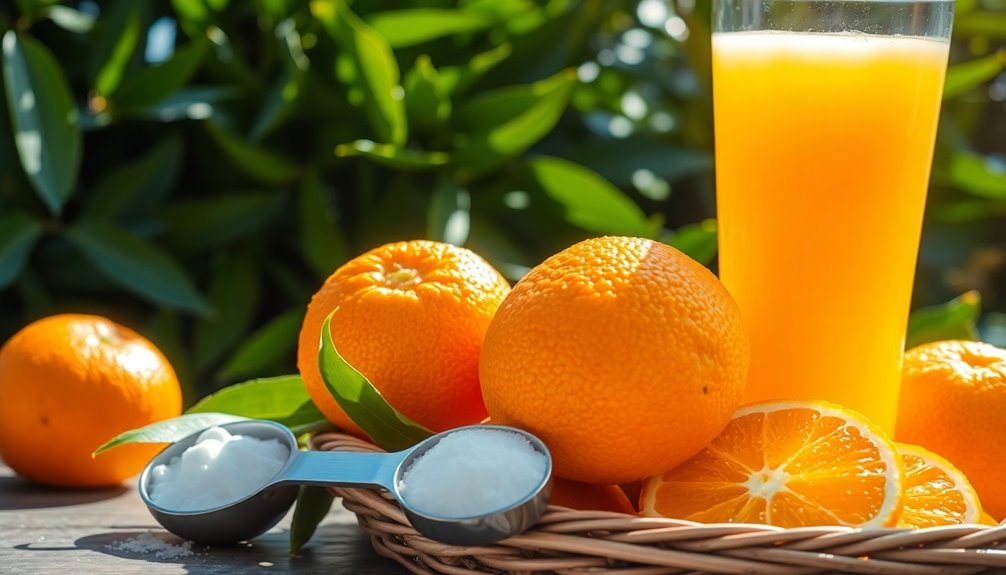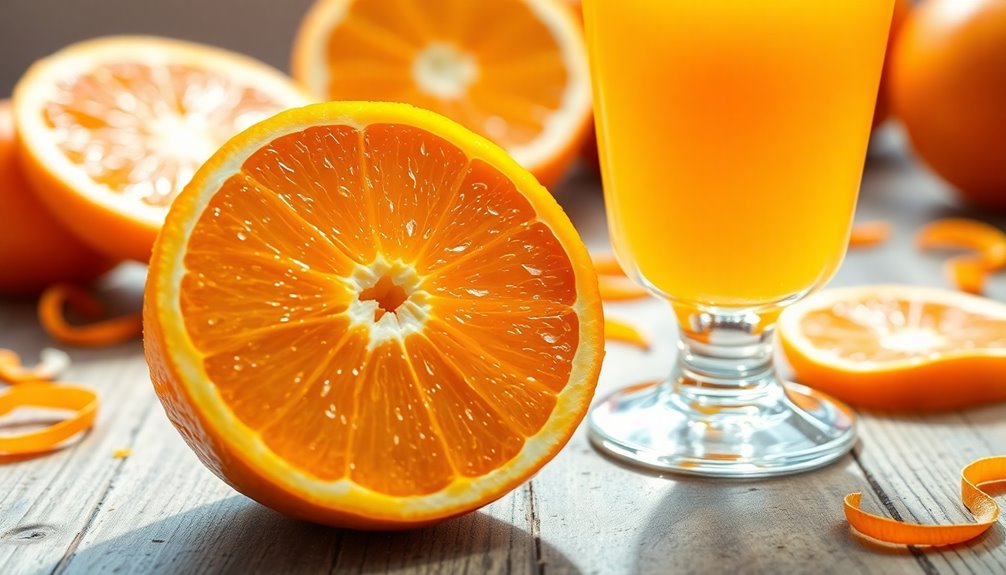Orange juice is packed with nutrients that’ll surprise you! One cup has about 110 calories and 21 grams of sugar, making it a calorie-dense option. It’s rich in vitamin C, potassium, and antioxidants that support heart health and immune function. However, it lacks the fiber whole oranges offer, which keeps you full. With various types available, including fresh and frozen, there’s more to discover about this delicious drink’s benefits. Keep going to uncover more fascinating facts! Additionally, many brands fortify their orange juice with calcium and vitamin D, enhancing its health benefits even further. For those trying to monitor their sugar intake, an orange juice nutritional analysis can help you make informed choices about portion sizes and alternatives. Overall, whether enjoyed alone or mixed into smoothies and cocktails, orange juice remains a flavorful way to boost your nutrient intake.
Key Takeaways
- One cup of orange juice contains about 110 calories, nearly double that of a medium orange, leading to potential weight gain.
- Orange juice is rich in vitamin C, providing around 70 mg per cup, which supports immune health and reduces inflammation.
- It contains about 25.5 to 27 grams of carbohydrates per cup, primarily from sugars, with a glycemic load that can raise blood sugar levels.
- Whole oranges offer about 2.8 grams of fiber, while juice has less than 1 gram, promoting digestive health and satiety.
- Fortified orange juice can provide about 30% of the Daily Value for calcium, crucial for maintaining strong bones.
The Caloric Content of Orange Juice

When you pour yourself a cup of orange juice, you're consuming about 110 calories, which is nearly double the calories found in a medium orange. This high caloric content comes mainly from its 21 grams of sugar per cup, making orange juice a less filling option compared to whole fruits. Since orange juice has a higher glycemic load, it can spike your blood sugar levels more than eating an orange would. Regularly drinking orange juice can lead to weight gain, with studies suggesting that each cup could add up to 0.5–0.75 pounds over four years. To manage your calorie intake, consider limiting your daily consumption and opting for whole oranges to benefit from their fiber and lower calories. Additionally, store-bought orange juice undergoes processing methods that can reduce its nutritional value compared to fresh options.
Protein Power: What's in Your Juice?

Have you ever wondered about the protein content in your favorite orange juice? You might be surprised to learn that it contains about 2 grams of protein per cup, which is relatively low compared to other nutrients.
The primary protein sources in orange juice are amino acids like arginine and aspartic acid, but they don't significantly contribute to your daily protein needs. In fact, only about 6% of the juice's macronutrient content is protein. Additionally, orange juice is a good source of vitamin C, providing 83% of your daily value in just one cup. Moreover, incorporating nutrient-rich foods like chia seeds into your diet can enhance digestive health and overall nutrition.
While whole oranges have a similar low protein content, they provide more fiber and satiety.
Ultimately, orange juice is much better for boosting your vitamin C and potassium intake than for meeting your protein requirements. So, enjoy it for the taste and nutrients, but don't rely on it for protein!
The Lowdown on Fat in Orange Juice

Although many people enjoy orange juice for its refreshing taste, it's important to know that it contains very little fat. In fact, a cup of orange juice has about 0.5 grams of total fat, with just 0.06 grams of saturated fat.
You'll find approximately 0.09 grams of monounsaturated fat and 0.1 grams of polyunsaturated fat in that same serving. Plus, orange juice is cholesterol-free, making it a heart-healthy choice. Whole oranges provide more fiber compared to orange juice, which can help keep you feeling full. While it shares a similar low fat content with whole oranges, juice lacks the fiber that keeps you feeling full. Remember, despite its low fat, orange juice has higher calories due to sugar, so it's best to enjoy it in moderation alongside other nutrient-rich foods.
Carbohydrates: Sweetness in Every Sip

While orange juice may be low in fat, its carbohydrate content is what gives it that signature sweetness in every sip. Each cup contains about 25.5 to 27 grams of carbs, primarily from sugars like sucrose, glucose, and fructose.
These carbs account for around 92% of the juice's calories, making it a quick energy source. However, with little fiber—only about 0.5 to 1 gram per cup—you won't get the same benefits as munching on a whole orange.
Plus, the glycemic load ranges from 10 to 15, which means it could raise your blood sugar levels. So, while indulging in that refreshing beverage, keep moderation in mind to avoid excessive carb intake!
Understanding Sugar Content in Orange Juice

How much sugar is really in orange juice? An 8-ounce cup packs around 20–26 grams of naturally occurring sugar from the oranges themselves, not added. This means you're getting natural sugars alongside essential vitamins, minerals, and antioxidants. Cold pressed or fresh-squeezed OJ is the best choice for nutrition and taste, ensuring you avoid any added sugars.
Compared to a 12-ounce can of soda, which has about 37 grams of added sugar, orange juice offers more nutritional benefits for fewer calories—approximately 110 calories versus 155 in soda.
However, be mindful that even natural sugars can impact your health. Consuming too much can lead to weight gain and tooth decay.
Vitamin C: The Immune Booster in a Glass

Vitamin C is often hailed as a powerful immune booster, and a glass of orange juice is one of the best ways to get it. Packed with vitamin C, just one cup provides twice the daily recommended value, supporting your immune system by promoting immune cell function and protecting your cells.
Regularly sipping orange juice can help fend off respiratory illnesses like the common cold and flu, thanks to its antioxidant properties. Plus, vitamin C enhances collagen production, supporting your skin and bones. Additionally, orange juice provides other key nutrients needed for immune support, including folate, potassium, and vitamin D. Incorporating inflation-protected annuities into your retirement planning can also help you maintain your financial health as you prioritize your well-being.
With around 70 mg of vitamin C per 8-ounce serving, it rivals many supplements while offering additional nutrients. So, enjoy that refreshing glass of orange juice and give your immune system the boost it needs!
Vitamin A: Brightening Your Health

Orange juice isn't just a powerhouse of vitamin C; it also contains vitamin A, which plays a vital role in your overall health.
This essential vitamin supports your vision, immune function, and cell growth. It's crucial for maintaining your eyesight, particularly in low light, and helps prevent night blindness. By promoting the health of your cornea and conjunctiva, vitamin A helps keep your eyes in top shape. Additionally, it aids in the growth and distribution of T cells for immune protection, stimulating the production of white blood cells to fend off infections. Adequate vitamin A intake is vital for fetal development and reproductive health too.
Potassium: A Heart-Healthy Mineral

While you might think of orange juice primarily for its vitamin C content, it's also an excellent source of potassium, a mineral that's essential for heart health.
Potassium plays a crucial role in muscle function, helping your heart contract effectively and maintain a regular heartbeat. It aids nerve responses and helps transport nutrients into cells while removing waste. Additionally, the low sodium content in oranges helps maintain lower blood pressure, further enhancing their heart-healthy benefits. A diet rich in potassium can contribute to kidney health maintenance, as it supports efficient kidney function.
By counteracting sodium, potassium helps regulate blood pressure, reducing the risk of artery hardening and stroke. A potassium-rich diet, including orange juice, can significantly support your overall heart health.
Aim for the recommended daily intake of 4,700 milligrams to enjoy these benefits, but be mindful if you have kidney issues or are on certain medications.
The Importance of Folate in Your Diet

Folate plays a vital role in your overall health, as it's essential for red blood cell formation and healthy cell growth. It aids in DNA synthesis and repair, crucial for proper cell function. Folic acid supplements can prevent neural tube birth defects, making it especially important for women who are pregnant or planning to become pregnant.
Without adequate folate, you might experience symptoms like anemia and poor growth. This nutrient works alongside other vitamins to metabolize proteins effectively. You can find folate in dark green leafy vegetables, beans, and citrus fruits like oranges. The recommended daily intake for adults is 400 micrograms, while pregnant women should aim for 600 micrograms.
Incorporating folate-rich foods into your diet can help reduce the risk of neural tube defects in newborns and lower cardiovascular disease risk.
Calcium and Its Role in Bone Health

Calcium is a crucial mineral when it comes to maintaining strong bones and overall health. While oranges contain some calcium, they shouldn't be your primary source. Your bones are made up of calcium salts like calcium phosphate, which help strengthen them. For optimal calcium absorption, you need vitamin D; without it, you're at risk of conditions like osteomalacia and osteoporosis. It's especially important to increase your calcium intake during childhood, adolescence, pregnancy, and as you age. Additionally, vitamin D fortification in fortified orange juice can enhance calcium absorption, making it an even better option for improving bone health. Studies show that maintaining adequate RMDs can also help prevent bone-related health issues in older adults.
Fortified orange juice can be a convenient way to boost your calcium and vitamin D intake, providing about 30% of your Daily Value in an 8-ounce serving. So, consider adding it to your diet for better bone health!
Health Benefits of Drinking Orange Juice

Drinking orange juice offers a variety of health benefits that can complement your overall well-being.
It's packed with vitamin C and antioxidants, which help protect your heart by reducing inflammation and oxidative stress. The high potassium content can lower blood pressure and reduce cardiovascular disease risk. Plus, the flavonoid hesperidin may improve heart health by lowering cholesterol levels and increasing HDL or "good" cholesterol. Additionally, high vitamin C content supports immune system function, enhancing white blood cell production and reducing inflammation. Furthermore, its antioxidant properties can help combat free radicals, further contributing to overall health.
Its rich nutritional profile aids in iron absorption and promotes gut health.
With these benefits, incorporating orange juice into your diet can be a delicious way to boost your health and vitality.
The Fiber Factor: Whole Oranges vs. Juice

While many people enjoy a glass of orange juice in the morning, it's essential to consider the differences between whole oranges and their juiced counterparts.
Whole oranges pack a fiber punch, providing about 2.8 grams in a medium fruit, compared to less than 1 gram in a cup of orange juice. This fiber not only promotes digestive health but also keeps you feeling full longer, reducing the chances of overeating. Additionally, consuming whole oranges offers a lower calorie intake compared to drinking juice, which can help with weight management. Furthermore, the high fiber content in whole oranges can enhance digestion and improve gut health.
Juice, on the other hand, is less filling and can lead to higher sugar intake. By choosing whole oranges, you support weight management and enjoy a more balanced intake of nutrients.
Different Types of Orange Juice Explained

When it comes to enjoying orange juice, you'll find a variety of options available, each with unique characteristics and benefits.
For instance, Frozen Concentrated Orange Juice (FCOJ) is made by pasteurizing and concentrating juice, then freezing it. Not from Concentrate (NFC) juice, on the other hand, is pasteurized and stored without concentration, often with added flavor packs.
Canned orange juice retains vitamin C but may lose flavor, while freshly squeezed, unpasteurized juice offers the freshest taste with a short shelf life. Orange juice's acidity (pH around 3.5) may affect dental health, making it important to consume it in moderation.
Popular varieties include Valencia, Blood, and Navel oranges, each bringing distinct flavors.
Brands like Tropicana and Minute Maid offer their own takes, while additives like vitamin D and omega-3 fatty acids can enhance nutritional value.
Daily Nutritional Contributions of Orange Juice

Orange juice can be a tasty way to boost your daily nutrient intake, providing essential vitamins and minerals in just a single serving.
In an 8-ounce glass, you'll get about 110 calories and 25.5 grams of carbohydrates. Plus, it packs a powerful punch of vitamin C, giving you 137% of the recommended daily intake, which supports your immune health.
You'll also find folate, thiamine, potassium, and magnesium to help round out your diet. While it's beneficial, remember it has higher sugar and calorie content than whole oranges, so keep your intake to one cup per day. Additionally, the antioxidants in orange juice provide heart health benefits by combating oxidative stress.
Enjoy the antioxidants and heart health benefits, but balance it with fiber-rich whole fruits for optimal health.
Frequently Asked Questions
Can Orange Juice Help With Hydration?
Yes, orange juice can definitely help with hydration. With nearly 90% water content, it effectively keeps you hydrated.
The potassium in orange juice aids in maintaining fluid balance, making it a great option after exercising. Studies show it hydrates similarly to water and sports drinks without causing gastrointestinal issues.
Just remember to enjoy it in moderation, as it's calorie-dense, but it also provides essential nutrients that support your overall health.
Is Orange Juice Safe for Diabetics?
Imagine a sun-kissed orange, bursting with juice, yet inside lies a hidden challenge for diabetics.
Orange juice can raise your blood sugar quickly due to its high sugar content and lack of fiber. While it's rich in vitamin C, moderation is key.
If you enjoy it, balance it with fiber-rich foods or stick to whole oranges for a safer choice. Always listen to your body and consult your healthcare provider about your dietary needs.
How Much Orange Juice Is Recommended Daily?
You should aim to limit your orange juice intake to no more than 8 ounces (240 ml) per day if you’re an adult. This recommendation helps manage sugar consumption and ensures that you’re not exceeding your daily calorie limits. It’s also important to consider the juice content in an orange, as whole fruits provide more fiber and essential nutrients compared to their juiced counterparts. By choosing to eat oranges instead of drinking their juice, you can enjoy the benefits of increased fiber intake while still satisfying your cravings for sweetness.
For children, the amount varies; younger kids should have 4-6 ounces, while older ones can have up to 8 ounces.
Does Orange Juice Contain Antioxidants?
Did you know that orange juice can have ten times the antioxidant capacity previously thought? Yes, it contains a variety of antioxidants, including vitamin C, flavonoids, and carotenoids.
These compounds work together to boost your immune system, reduce inflammation, and support heart health. When you drink orange juice, you're not just enjoying a tasty beverage; you're also giving your body powerful nutrients that help protect against chronic diseases and oxidative damage.
Can Orange Juice Cause Acid Reflux?
Yes, orange juice can cause acid reflux. Its high acidity irritates your esophagus and can trigger heartburn symptoms.
When you drink orange juice, the citric acid can affect your lower esophageal sphincter, leading to gastroesophageal reflux.
If you're prone to acid reflux, you might want to limit your intake of orange juice or choose low-acid alternatives to avoid discomfort.
Moderation is key to managing your symptoms effectively.
Conclusion
Incorporating orange juice into your diet can be a delicious way to boost your nutrition. With its vibrant flavor and numerous health benefits, it's a refreshing choice for breakfast or a midday pick-me-up. For instance, imagine a busy mom who starts her day with a glass of orange juice—she's not only energizing herself but also giving her kids a tasty source of vitamin C. So go ahead, pour yourself a glass and enjoy the benefits!
Cindy thoroughly researches juicing trends, techniques, and recipes to provide readers with practical advice and inspiration. Her writing style is accessible, engaging, and designed to make complex concepts easy to understand. Cindy’s dedication to promoting the advantages of juicing shines through her work, empowering readers to make positive changes in their lives through the simple act of juicing.











